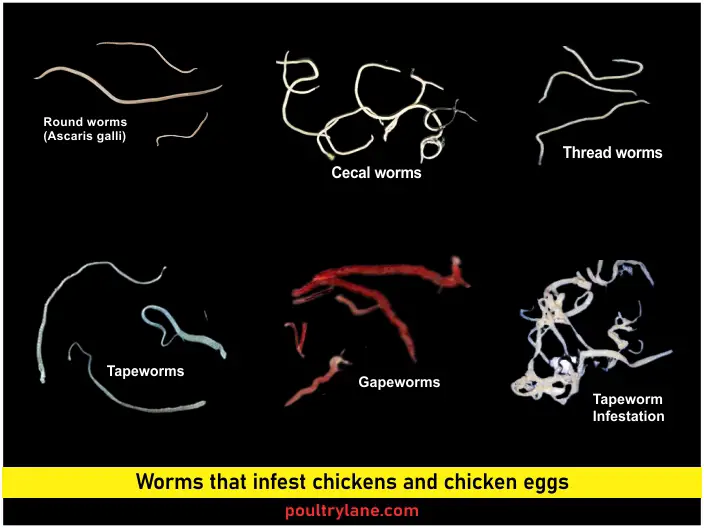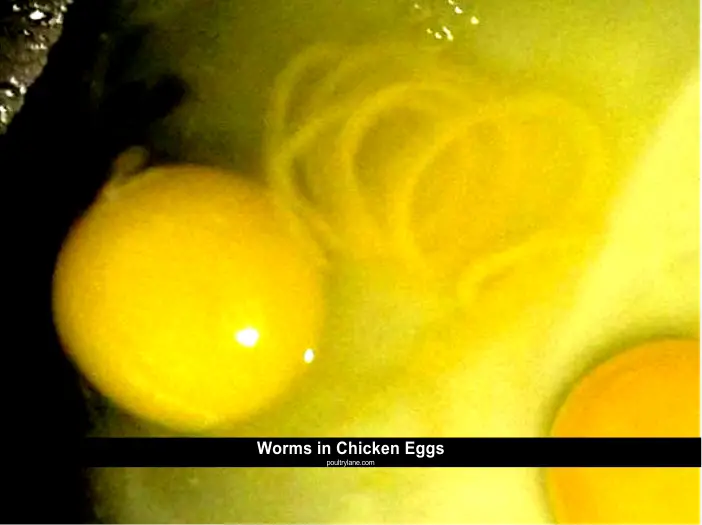Worms in chicken eggs are common, especially when the egg-laying hens are left to free range. While looking for food outdoors, chickens can easily pick worms when eating infected insects or droppings from other birds. After ingestion, the worms are passed from the oviduct to the eggs.
Ascaridida (Ascaridia galli/roundworm) is the most popular intestinal worm in chicken eggs. Others include cecal, hairworms, and tapeworms, which can also be found in eggs. Here are images of what worms in chicken eggs look like;

Table of Contents
What do worms in chicken eggs look like?
Worms from a hen’s oviduct are the ones that get into their eggs. Roundworms look thick and white and may have a length of about 12cm. Caecal worms are about 1.5cm long and whitish with a pointed tail. Hairworms are tiny and thread-like and may not be easily seen by your naked eye.
It may not be easy to spot worms in chicken eggs. Therefore, always look for other signs of worm infestation, like weight loss, pale/dry combs, and reduced appetite.
Do not confuse the chalaza for worms. The chalaza is two stringy or rope-like structures naturally attached to the bottom and top of a shell to safeguard the yolk from slamming into the walls of an egg.

- FOR LAYING POULTRY: Our crushed oyster shells are crafted to provide essential calcium for all laying poultry including chickens, ducks, and quails; from backyard flock to commercial farms, our product is the perfect addition to your chicken feed
- OYSTER SHELL & CORAL CALCIUM: Our chicken oyster shells are made from a blend of crushed oyster shells and coral calcium, ensuring that your poultry receive a high-quality source of chicken calcium that is easily digestible
- STRONGER EGGSHELLS: Our crushed oyster shells are an excellent source of calcium for chickens, providing the necessary nutrients for proper eggshell formation, resulting in high-quality eggs and a healthier flock overall
- HEAT TREATED FOR PURITY:Our oyster shells for chickens are heat treated to ensure maximum purity and cleanliness; our crushed oyster shells for chickens are free from harmful contaminants, bacteria and pathogens, making it safe for your poultry to consume
As an Amazon Associate, we earn from qualifying purchases.
Types of worms in chicken eggs
Chicken eggs may have different kinds of worms determined by their environment, species, and what they feed on. Types of worms in chicken eggs may include:
1. Roundworms
Roundworms usually infest the small intestine of chickens. They will find their way into the chicken eggs if the infestation is high. Signs of roundworm infestation include chicken diarrhea and poor eating habits.
Once the signs are noted, they should be controlled since they lower the ability of a chicken to absorb nutrients as required. The worms damage and impede the intestine walls in a chicken.
As a common worm in backyard birds, you may observe parasitic worms in poop and chicken eggs when the infestation is excessive. Roundworms should be controlled before their effects affect a chicken’s eyes, wattles, and overall weight.
2. Hairworms/threadworms
Also known as capillary parasites or threadworms, they are thin and appear like threads. These worms are mostly picked from infected droppings as the birds eat around. Therefore, egg-laying hens should be controlled when living in an infested area.
Threadworms can be found in different parts of the chicken’s body, including the crop, intestines, and esophagus.
Because of their tiny size, it may not be possible to spot hairworms in chicken eggs. Too many hairworms are bad as they may reduce the ability of your birds to absorb vital vitamins and nutrients.
3. Cecal worms
Although very common with backyard poultry, cecal parasitic worms are not dangerous to chickens but are deadly to turkeys. The worms reside in the caecum, a large tube or pouchlike structure marking the beginning of the large intestine. It is in the caecum where smelly droppings are usually created.
Fenbendazole is the only product that is currently approved for treatment and control of roundworms (Ascaridia spp.) and cecal worms (Heterakis spp.) in chickens and turkeys in the United States. Fenbendazole is available as a medicated feed labelled for use in turkeys (Safe-Guard) or in a water-soluble formulation to be added to drinking water (Safe-Guard AquaSol) labelled for use in chickens.
The Pennsylvania State University, PennState Extension.
4. Gapeworms
When they infest your birds, gapeworms will mainly live in the trachea. That is why chickens with gapeworms always experience breathing problems. The chickens open their mouths, stretch their necks, gasp, or cough frequently to breathe and expel the worms.
Gapeworms can find their way into a chicken’s egg before the shell is formed. They appear red, have a fork-like shape, and can be treated using a wormer, I.e., Waze.
5. Tapeworms
Insects and birds, such as earthworms and beetles, can transmit parasitic worms. Because tapeworms mainly attack different parts of the intestinal wall, that may cause a weaker immune system for your birds.
Try controlling tapeworms using fenbendazole or levamisole, popular solutions for treating infections in birds and animals kept at home.
- FOR LAYING POULTRY: Our crushed oyster shells are crafted to provide essential calcium for all laying poultry including chickens, ducks, and quails; from backyard flock to commercial farms, our product is the perfect addition to your chicken feed
- OYSTER SHELL & CORAL CALCIUM: Our chicken oyster shells are made from a blend of crushed oyster shells and coral calcium, ensuring that your poultry receive a high-quality source of chicken calcium that is easily digestible
- STRONGER EGGSHELLS: Our crushed oyster shells are an excellent source of calcium for chickens, providing the necessary nutrients for proper eggshell formation, resulting in high-quality eggs and a healthier flock overall
- HEAT TREATED FOR PURITY:Our oyster shells for chickens are heat treated to ensure maximum purity and cleanliness; our crushed oyster shells for chickens are free from harmful contaminants, bacteria and pathogens, making it safe for your poultry to consume
As an Amazon Associate, we earn from qualifying purchases.
Causes of worms in chicken eggs
The main cause of worms in chicken eggs is that after the chicken gets worms from eating infested insects or droppings from other birds, the worms find their way into the chicken’s oviduct, where they settle in the egg.
Worm eggs or larvae can be ingested directly from the grounds when your birds are pecking at anything and everything. The main culprits that spread chicken worms include slugs, earthworms, and snails.
The causes of worms in chicken eggs are either indirect or direct contact. Because of the toughness of worm eggs and larvae, they can survive on the ground for months or even years just waiting for a host.
Chicken may also get worms directly when they come into contact with other infested birds in a flock or by ingesting a sick intermediate host, like bugs and insects. If chickens have worms in their poop, there is a high chance that you will find them in their eggs.
Can you get worms from chicken eggs?
“Chickens and other live poultry can carry Salmonella bacteria. These germs can spread from the birds to their eggs. If you eat raw or undercooked eggs, you can get sick. Always handle and cook eggs properly to prevent illness.”
CDC Centers for Disease Control and Prevention
There is a minimal chance that worms in an egg will infect you if the eggs are properly cooked. Eating raw eggs exposes you to infections.
Often, it is not easy for worms to be inside eggs, even if your egg-laying birds have an overload. Sometimes, there may be worms in the eggshell, especially if one that is contaminated was broken around it. Those can be washed off with warm water. Always clean your hands after collecting eggs.
What to do if you find worms in chicken eggs
If you find worms in chicken eggs, try to deworm your flock immediately. Confirm with your local vet the best medication to give your poultry and follow the directions of use provided by the manufacturer.
You may use potentially effective natural and organic dewormers to treat your chickens. Frequently add garlic, Diatomaceous Earth, apple cider vinegar, or any other ingredient with anti-bacterial properties to your chickens’ feed and drinking water.
Since eliminating parasitic worms from your chickens is problematic, spend more time preventing an attack and overload. For instance:
- Keep the environment of your chickens dry.
- Regularly clean a chicken’s coop and other objects like feeders to eliminate potentially infected droppings and discourage attacks by worms.
- Always add anti-parasitic medications to the drinking water of your poultry.
- Avoid putting chicken feed on the ground as it may promote worm infestation by ingestion.
- Treat new birds with dewormers before mixing them with the existing birds.
- Avoid keeping your chickens in one place. A location with an accumulation of manure or droppings will have a high load of parasitic worms.
Prevent and treat worm infections regularly so your poultry remains healthy and productive. Always look for potential worm infestation signs in birds and eggs. Some signs may include vomiting, pale yolk and/or comb, neck stretching, discolored vent, and excessive sleeping.
- FOR LAYING POULTRY: Our crushed oyster shells are crafted to provide essential calcium for all laying poultry including chickens, ducks, and quails; from backyard flock to commercial farms, our product is the perfect addition to your chicken feed
- OYSTER SHELL & CORAL CALCIUM: Our chicken oyster shells are made from a blend of crushed oyster shells and coral calcium, ensuring that your poultry receive a high-quality source of chicken calcium that is easily digestible
- STRONGER EGGSHELLS: Our crushed oyster shells are an excellent source of calcium for chickens, providing the necessary nutrients for proper eggshell formation, resulting in high-quality eggs and a healthier flock overall
- HEAT TREATED FOR PURITY:Our oyster shells for chickens are heat treated to ensure maximum purity and cleanliness; our crushed oyster shells for chickens are free from harmful contaminants, bacteria and pathogens, making it safe for your poultry to consume
As an Amazon Associate, we earn from qualifying purchases.
